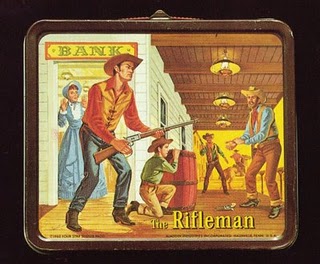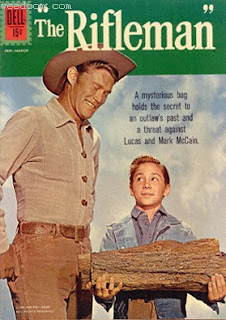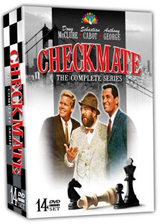 My Three Sons debuted in the fall of 1960 starring Fred MacMurray in the role of Steve Douglas, a widowed aerospace engineer raising his three sons Mike (Tim Considine), Robbie (Don Grady), and Chip (Stanley Livingston) with the help of his father-in-law Bub O'Casey (William Frawley). The show changed personnel several times over its 12-year run, and eventually had Steve remarrying and adopting his new wife's daughter. But for most of its existence, the show depicted the ups and downs of an all-male household, a sharp contrast to prior family comedies like Leave It to Beaver, Father Knows Best, and The Adventures of Ozzie and Harriet.
My Three Sons debuted in the fall of 1960 starring Fred MacMurray in the role of Steve Douglas, a widowed aerospace engineer raising his three sons Mike (Tim Considine), Robbie (Don Grady), and Chip (Stanley Livingston) with the help of his father-in-law Bub O'Casey (William Frawley). The show changed personnel several times over its 12-year run, and eventually had Steve remarrying and adopting his new wife's daughter. But for most of its existence, the show depicted the ups and downs of an all-male household, a sharp contrast to prior family comedies like Leave It to Beaver, Father Knows Best, and The Adventures of Ozzie and Harriet.However, My Three Sons wasn't the first TV program to feature a single parent --John Forsythe's Bachelor Father debuted in 1957 with Forsythe's character Bentley Gregg playing adoptive father to his orphaned niece (in fact, the November 12, 1960 issue of TV Guide described My Three Sons as "a sort of Bachelor Father with boys"); Chuck Connors played widower Lucas McCain raising his son Mark on The Rifleman, which debuted in 1958; and Lorne Green played widower Ben Cartwright with three adult sons on Bonanza starting in 1959. But My Three Sons was the first to show a house full of men fending for themselves. Much of the show's humor derived from the male housekeeper attempting and often succeeding in fulfilling the roles traditionally performed by the woman of the house. In fact, author Nina Leibman in an article on museum.tv goes so far as to say, " the bulk of the program's first five years did not focus on the stereotypical male ineptitude for all household chores, but instead continually reinforced the notion that males were, in fact, far domestically superior to the 'hysterical' female guest stars." This theme shows up as early as the second episode, "The Little Ragpicker" (Oct 6, 1960), in which spinster Miss Pitts (Marjorie Eaton) observes what appears to be drunken behavior on the part of Bub and feels that she must protect Chip from him and spread the awful news to other women in the neighborhood. Of course, her assumptions all turn out to be wrong, and once she faints outside the Douglas house and is revived inside, she has a chance to actually talk to them and see that all is perfectly fine. And in the very first episode, "Chip Off the Old Block" (Sep 29, 1960), both Chip and Steve are being pursued by females but prefer not to be caught. Leibman goes on to say that My Three Sons set the formula for many other situation comedies in years to come that featured single-parent (particularly male) households as a kind of new normal, such as Family Affair and The Courtship of Eddie's Father, whereas those that later showed a single female parent, like The Ghost and Mrs. Muir and Julia, required that the woman have a male advisor, either supernatural or fleshly. Sexual stereotypes also play a role in the episode "Lady Engineer" (Nov 10, 1960) in which Steve is assigned to work with brilliant engineer J.M. Johnson, who he assume is a man. When he sees a woman in the room containing a model of the satellite and telescope he will be working on with Dr. Johnson, he tries explaining it to her in simplistic terms, until he finds out who she really is. From that point forward, he pursues her romantically, and when she has to return to Washington once the assignment is finished, she considers what she has given up romantically in pursuing a professional career.
Other episodes focus on disagreements between the boys, particularly the two oldest, Mike and Robbie; Robbie's maturation; Chip being left out as the youngest son; and Bub's past in show business. And, of course, many episodes feature Steve's sage advice to the boys, although sometimes the adults are portrayed as being foolish, as in "The Elopement" (Dec 22, 1960), in which Bub and Steve assume that Mike and his girlfriend Jean Pearson have gone down to city hall to get married when they are actually just working on a school sociology project.
But perhaps because it was a new series just finding its footing, a couple of the early episodes seem, to use a favorite word of Chip's, "clunky." The show's fourth episode, "Countdown" (Oct 20, 1960) draw a contrived parallel between the precision preparations required to launch a missile and the chaotic activities of the Douglas household as they get ready for work and school on a Monday morning. And the episode "Adjust or Bust" (Nov 3, 1960) contains an overly long slapstick scene in which Steve is driving General Heffler and his aide to their hotel in Mike's cramped jalopy, complete with sped-up film and silent-movie-era piano music. Again, TV Guide described the show as "not the most sparkling idea ever invented for TV," and in episodes like this one, not even the sparkling acting of Fred MacMurray can save it.
 The memorable, spritely theme music for the show was composed by Frank De Vol, best known as an arranger, first at Capitol Records, where he worked with Ella Fitzgerald, Sarah Vaughan, Tony Bennett, Dinah Shore, Doris Day, and Nat King Cole, for whom he arranged the hit "Nature Boy." He was then given an executive position with Columbia Records, for whom he also recorded a number of instrumental albums released under his last name only. Besides My Three Sons, he also wrote the theme music for Family Affair, Gidget, and The Brady Bunch. He also wrote scores for feature-length films and received four Oscar nominations. And, to top it off, he also was an actor, usually in comic roles on shows such as Get Smart, I Dream of Jeannie, and Petticoat Junction. He also played bandleader Happy Kyne on the Martin Mull talk show parodies Fernwood 2Nite and American 2-Night.
The memorable, spritely theme music for the show was composed by Frank De Vol, best known as an arranger, first at Capitol Records, where he worked with Ella Fitzgerald, Sarah Vaughan, Tony Bennett, Dinah Shore, Doris Day, and Nat King Cole, for whom he arranged the hit "Nature Boy." He was then given an executive position with Columbia Records, for whom he also recorded a number of instrumental albums released under his last name only. Besides My Three Sons, he also wrote the theme music for Family Affair, Gidget, and The Brady Bunch. He also wrote scores for feature-length films and received four Oscar nominations. And, to top it off, he also was an actor, usually in comic roles on shows such as Get Smart, I Dream of Jeannie, and Petticoat Junction. He also played bandleader Happy Kyne on the Martin Mull talk show parodies Fernwood 2Nite and American 2-Night.The Actors
 Fred MacMurray
Fred MacMurray
By 1960 MacMurray had already enjoyed a long and prolific career in feature-length films, starting out as a romantic lead in the 1930s opposite such stars as Marlene Dietrich, Carole Lombard, Claudette Colbert, and even Katherine Hepburn. But his career had started to tail off in the 1950s, as he was continually cast in second-rate westerns like Good Day for a Hanging and Gun for a Coward. Things began looking up again in 1959 when he began appearing in a string of successful Disney comedies, beginning with The Shaggy Dog, in which he played a wholesome family man, in stark contrast to earlier film roles such as duped insurance salesman Walter Neff in Billy Wilder's noir classic Double Indemnity or cowardly instigator Lt. Tom Keefer in The Caine Mutiny. This new image was perfect for My Three Sons because the idea for the show originally came from sponsor Chevrolet for a series "representative of America" (Leibman, museum.tv), and MacMurray was half owner of the show. According to the aforementioned TV Guide article, MacMurray was at first reluctant to try his hand at television but was convinced when executive producer Don Fedderson proposed a shooting schedule in which all of his scenes would be shot in 65 days over the course of three months (Leibman says that MacMurray came up with the work arrangement after conferring with Father Knows Best star Robert Young). A shrewd investor in California real estate, MacMurray ran a Sonoma County family ranch which also included a winery still run today, with his daughter Kate as its spokesperson. He was also reputedly very frugal and a staunch conservative, campaigning for Richard Nixon in 1968. He suffered from leukemia late in life and died November 5, 1991.
William Frawley
 Frawley became a star playing Lucy and Desi's neighbor Fred Mertz on I Love Lucy from 1951 to 1957, though he had appeared in about 100 films prior to that, after a successful career in vaudeville and on Broadway. He had to lobby mightily for the role on Lucy because he was a known alcoholic and misanthrope. But he became a good friend of Desi Arnaz and never came to the set under the influence. When Lucy ended, he and Vivian Vance were offered a spin-off show, which he was willing to do, but she refused. He played Bub for the first five seasons of My Three Sons, but then became ill and died of a heart attack on March 3, 1966. According to Leibman, Fedderson canceled his $300,000 life insurance policy when he became terminally ill. His character was replaced by William Demarest as Uncle Charlie for the remainder of the series.
Frawley became a star playing Lucy and Desi's neighbor Fred Mertz on I Love Lucy from 1951 to 1957, though he had appeared in about 100 films prior to that, after a successful career in vaudeville and on Broadway. He had to lobby mightily for the role on Lucy because he was a known alcoholic and misanthrope. But he became a good friend of Desi Arnaz and never came to the set under the influence. When Lucy ended, he and Vivian Vance were offered a spin-off show, which he was willing to do, but she refused. He played Bub for the first five seasons of My Three Sons, but then became ill and died of a heart attack on March 3, 1966. According to Leibman, Fedderson canceled his $300,000 life insurance policy when he became terminally ill. His character was replaced by William Demarest as Uncle Charlie for the remainder of the series. Tim Considine
Tim Considine
Son of a movie producer, Considine played the oldest of the three sons, Mike, until 1965 when he had a dispute with executive producer Fedderson because he wanted to direct some of the episodes, at which point his character was written out of the series and he was replaced by Barry Livingston as adopted youngest son Ernie. Prior to My Three Sons, he had appeared in a pair of Mickey Mouse Club serials and the 1959 Disney movie The Shaggy Dog with MacMurray. After My Three Sons, he made occasional appearances on TV shows such as Bonanza, Ironside, and Gunsmoke and he appeared in the film Patton as a soldier who is slapped by Patton for being a coward. These days he is a writer and automotive historian and has written for Road and Track magazine.
Don Grady
 Born Don Luis Agrati, Grady played the middle son Robbie, until the departure of Tim Considine vaulted him to the eldest son spot. In the later years of the series, his character fell in love with and married Tina, played by Tina Cole, with whom he had a real-life affair. Like Considine, Grady came up through the Disney factory as a Mouseketeer, but had a longer list of TV appearances prior to My Three Sons, including The Rifleman, The Restless Gun, and The Ann Sothern Show. He also made occasional appearances on other shows during his run on My Three Sons, including Wagon Train, Have Gun, Will Travel, The Lucy Show, and Love American Style. He has not had many appearances, however, since My Three Sons went off the air in 1971, but has devoted more time to his music career. He was the drummer and a vocalist in the sunshine pop group Yellow Balloon, and later released solo albums under his given name.
Born Don Luis Agrati, Grady played the middle son Robbie, until the departure of Tim Considine vaulted him to the eldest son spot. In the later years of the series, his character fell in love with and married Tina, played by Tina Cole, with whom he had a real-life affair. Like Considine, Grady came up through the Disney factory as a Mouseketeer, but had a longer list of TV appearances prior to My Three Sons, including The Rifleman, The Restless Gun, and The Ann Sothern Show. He also made occasional appearances on other shows during his run on My Three Sons, including Wagon Train, Have Gun, Will Travel, The Lucy Show, and Love American Style. He has not had many appearances, however, since My Three Sons went off the air in 1971, but has devoted more time to his music career. He was the drummer and a vocalist in the sunshine pop group Yellow Balloon, and later released solo albums under his given name. Stanley Livingston
Stanley Livingston
Before My Three Sons, Livingston had appeared in a few films (including the Doris Day vehicle Please Don't Eat the Daisies) and had an occasionally recurring role on The Adventures of Ozzie and Harriet. His real-life brother Barry Livingston was cast as his friend Ernie, who after Tim Considine was written out of the show, is adopted by the Douglases as the new third son. After My Three Sons, his acting appearances were sparse, except for a few B movies in the 90s like Attack of the 60 Foot Centerfolds and Bikini Drive-In. However, he has been active producing children's shows for PBS and producing an 8-DVD package titled The Actor's Journey, which features interviews with over 100 actors on their careers and craft. He has also produced stained-glass works for celebrities such as Tom Hanks and Hugh Hefner.
Notable Guest Stars
Season 1, Episode 1, "Chip Off the Old Block": Patricia Berry (Kate Harris on Harris Against the World) plays Pamela Maclish, a single woman pursuing Steve; Harlan Warde ( banker John Hamilton on The Rifleman and Sheriff John Brannan on The Virginian) appears as Hal Mosby, a friend of Steve's who, with his wife, sets up Steve with Maclish.
Season 1, Episode 2, "The Little Ragpicker": Marjorie Eaton (That Forsyte Woman, Witness for the Prosecution) plays nosy neighbor Cynthia Pitts.
Season 1, Episode 5, "Brotherly Love": Beau Bridges (Seaman Howard Spicer on Ensign O'Toole and Major General Hank Landry on Stargate: Atlantis and Stargate SG-1) plays Mike's friend Russ; Cheryl Holdridge (Julie Foster on Leave It to Beaver) plays Judy Doucette, a pretty girl Robbie likes but who is interested in Mike.
Season 1, Episode 6, "Adjust or Bust": Richard Deacon (Mel Cooley on The Dick Van Dyke Show) plays an old man on a city bus who bores Steve to sleep; Kate Murtagh (Iona Dobson on It's a Man's World) plays the unattractive daughter of a Scandinavian man who is trying to get Steve interested in her.
Season 1, Episode 7, "Lady Engineer": Dorothy Green (Lavinia Tate on Tammy) plays the Lady Engineer, Joan Johnson.
Season 1, Episode 8, "Chip's Harvest": Cynthia Pepper (Margie Clayton on Margie) plays Mike's girlfriend, Jean Pearson.
Season 1, Episode 10, "Lonesome George": George Gobel (The George Gobel Show, Mayor Otis Harper, Jr. on Harper Valley) plays himself; Michael Quinn (Nick Craig on Ghost Squad) plays overzealous hotel PR man Ken Monroe.
Season 1, Episode 11, "Spring Will Be a Little Late": Marta Kristen (Judy Robinson on Lost in Space) plays Peggy "Pig" Meredith, Robbie's mechanic friend who is maturing into a young woman.
Season 1, Episode 13, "The Elopement": Cynthia Pepper returns as Jean Pearson (see "Chip's Harvest" above); Florence MacMichael (Winnie Kirkwood on Mister Ed) plays her mother; Robert P. Lieb (Harry Thompson on Hazel) plays her father.







